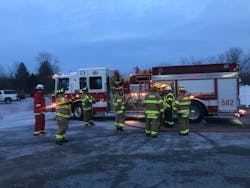Editor's note: Find Firehouse.com's complete coverage of the COVID-19 pandemic here.
The effects of COVID-19 on our nation are overwhelming. Many of our fast-paced lives have been uprooted to confinement in our homes. The media has covered nearly every aspect of how the coronavirus has affected our communities, our citizens, and our economy. Our first responders, nation’s health care providers, and support services such as grocery clerks are facing dangers and new challenges. But, with all the media coverage, all the television news interviews, and all the talking head shows, the looming financial disaster of our nation’s volunteer fire and rescue departments has essentially been ignored.
The majority of our country is protected by volunteer fire departments. Though some volunteer companies receive some financial support from the local municipality or jurisdiction, many volunteer departments survive strictly on fundraising activities. With the restrictions of gathering in large groups, most restaurants, bars and other venues are completely closed. These same restrictions have canceled firehouse dinners, carnivals, bingo nights and other events that require a large attendance to be profitable.
Tough financial decisions
Many small rural fire departments will have to make a no-win decision whether to pay an insurance bill or the invoice for diesel fuel. Many departments literally need to raise funds to even purchase N95 masks. Though community mail fund drives are helpful, most members combine to work thousands of volunteer hours, in addition to responding to emergency incidents, to raise needed funds to purchase apparatus, pay for building mortgages and purchase equipment and supplies to provide emergency service to their community.
Many small volunteer fire departments do not have the financial reserve to sustain months of lost income. We are entering the summer months, which are generally prime time for large fundraising events, such as carnivals and chicken barbecues, tractor pulls, mud bogs, golf tournaments, music festivals, and other large outdoor events that face the realization of cancellation in the summer months. Even door-to-door and fill-the-boot type community fundraising will be stymied as people try to eliminate direct physical contact.
Raising awareness
We also need to be supportive of the funding needs of all aspects of our fire service. Local governments are also facing a dramatic financial shortfall without collecting taxes and other revenue. We need to make our local government leaders aware that funding, which is provided to support volunteer fire and rescue companies, must remain stable.
The alarm needs to be sounded at the state and federal level to assure specific funding is dedicated to assisting financially distressed volunteer fire and rescue companies. These funds need to be in addition to funding available for municipal, county and other government-supported fire and EMS services. Our political leaders must take action to ensure career staffing is not jeopardized and municipalities do not close neighborhood firehouses to offset budget deficiencies. We need to be vigilant that the federal government does not attempt to use FIRE Act Grant or SAFER Grant funding to be the relief needed in this time of crisis. We cannot allow any attempt to close the National Fire Academy or dismantle the U.S. Fire Administration as a money grab to provide needed funding.
Fire, rescue and EMS personnel are on the front line of this national catastrophe. The lives of our career and volunteer members are at a higher risk than ever. We must continue to advocate for needed PPE to ensure their safety. We must also advocate for the financial risk our nation’s fire and rescue companies are facing. The risk of financial collapse of a volunteer fire company will put the lives of a community at risk. In addition to saving the economy, our national and state leaders must also save the volunteer fire and rescue service of our nation from financial disaster.

Clarence Jewell
Clarence “Chip” Jewell is in his 54th year as an active volunteer. He is a life member of the Libertytown, MD, Volunteer Fire Department and the Junior Fire Co. No. 2 in Frederick, MD. Jewell retired in 2017 as the deputy chief/director of the Frederick County, MD, Division of Volunteer Fire & Rescue Services, a combination service that consists of 25 independent fire and rescue companies, 600 operational volunteers, 1,700 volunteers and more than 400 career personnel. He has a bachelor's degree in fire science from the University of Maryland/University College. Jewell is a management-level instructor for the Maryland Fire and Rescue Institute. He is active on several committees of the Maryland State Firemen’s Association.







